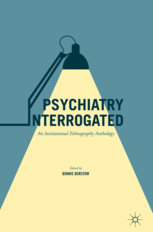
Psychiatry Interrogated, Edited by Bonnie Burstow
Bonnie Burstow‘s recently published book Psychiatry Interrogated: An Institutional Ethnography Anthology represents a watershed moment in the battle against coercive psychiatry. Dr. Burstow and her team of researchers and psychiatric survivors employ a method of social research known as IE, or Institutional Ethnography, to identify a variety of problems, or disjunctures, that arise as a result of psychiatry. Burstow’s book belongs in the cannon of criticism against coercive psychiatry, but it is uniquely fashioned to empower other opponents of institutional oppression. In other words, Psychiatry Interrogated doesn’t just interrogate. It provides tools for others to interrogate and combat coercive psychiatry.
Each main chapter in Psychiatry Interrogated examines a particular disjuncture that results directly or indirectly from the institution of psychiatry. These disjunctures include deceptive advertisements to promote damaging psychiatric interventions, harm caused by the “helping” professions, the psychiatrization and stigmatization of spirituality, the marketing power of autism, the global mental health craze, the pathologization of military trauma through PTSD and the DSM, bullying in academia, mental health manipulation in the work place, lawyering for the “mad,” and the academic development of torture in connection with the military and psychiatry.
Each main chapter exposes a portion of the ugly underbelly of psychiatry. For example, fake “researchers” recruit innocent people to participate in an alleged “study” that allows them to pass strong currents of electricity through the brains of their test subjects. Other victims are stigmatized and demoralized by false pseudo-medical labels, targeted for their personal approaches to spirituality, or branded by autism for financial gain. Similar unethical practices extend to every corner of the globe, infiltrate the military, the academy, the work place, and jurisprudence. Frighteningly, psychiatry even justifies torture in the name of governmental research, and “medicine.”
In his excellent review of Psychiatry Interrogated, Dr. Phil Hickey highlights Burstow’s concluding question to the reader:
“Are we as a society going about our everyday lives while complicit in everyday atrocities disguised as ‘help’?” (p 224)
The answer to this question is a resounding “yes.” Psychiatry Interrogated reveals a variety of ways in which harm disguised as “help” is a frequent and far reaching effect of psychiatry. Dr. Hickey’s chapter by chapter review is a sufficient summary of Burstow’s ground breaking work, but allow me to mention a few passages that may pique the interest, and arouse the indignation, of other potential opponents of coercive psychiatry:
- “Difficult thought it may be to wrap one’s head around this, there is additionally something profoundly wrong with psychiatry ‘medically,’ also on what might be called the hermeneutic level. As shown by Breggin (1991), Whitaker (2010), Woolfolk (2001), and Szasz (1987), there is no valid science underlying psychiatry, no proof that a single one of these putative diseases arise from a chemical imbalance – this despite years of insisting that they do – nor indeed proof that any physical correlate of any sort exists. Nor do their categorization schema (e.g., diagnoses) hold any explanatory value – for they are intrinsically, circular (in this regard), see Burstow 2015, Chapters 4 and 5).” (p. 3)
- “Now for some – not me – even the circularity evident here might be acceptable if the ‘treatments’ actually helped people. However, far from correcting imbalances – the ‘treatments’ have been shown conclusively to cause imbalances (see Breggin 2008; Whitaker 2010). They also give rise to highly uncomfortable neurological diseases (see Breggin 2008).” (p. 5)
- “The point here is that ECT does not ‘tell the brain’ anything. Plus, although new brain cells do sometimes emerge via a process called neurogenesis,’ they are defective cells – indeed, the result of an proof of neurological damage (see Kaplan et al. 2011), despite the positive spin commonly put on it.” (p. 29)
- “Unequivocally, we believe that the various diverse experiences banded together as ‘mental illness’ within psychiatry have nothing at all to do with ‘competence’ in the helping professions. At all, at all. Besides indeed, this is the crux of the story we hope to tell. That is, the equation of presumptive ‘mental illness’ with ‘incompetence’ is precisely the problematic that we hope to illuminate.” (p. 41)
- “Angela: My line was ‘If Jesus was alive today, he would be found on a psychiatric ward?” (p. 76)
- “Furthermore, and perhaps most important, now we better understand how these ruling relations come to directly act on parents and children labeled with ASD, and how parents, in particular, become active, if unwitting, agents in reproducing these relationships every time they activate an ASD text or narrative in the process of caring for their children. We hope that the activities and relations we have mapped here demonstrate how these shifts in ASD diagnosis and treatment are more than discursive or cultural.” (p. 97)
- “According to Angell (2005), by 1980, the pharmaceutical industry was positioned to take off as the multinational and multimillion-dollar business it has now become. The pharmaceutical industry used the DSM-III’s ‘scientized’ psychiatric message (American Psychiatric Association 1980) to promote drug research and medical interventions that remade psychiatric training and mental health practice (Moynihan et al. 2002). The new biomedical and psychiatric epidemiological discourse (Susser and Patel 2014) was widely adopted and had a globalizing influence (Juakubec and Campbell 2003).” (p. 108)
- “Could some soldiers have killed themselves not in spite of the treatment they were receiving, but because of its effects? Should not the fact that more than half of the CAF members who killed themselves in 2013 were receiving ‘the best care this country has to offer’ at the time of their suicides be an indication that the current system is not working?” (p. 133-34)
- “These two case studies illustrate how labels of ‘mental illness’ can be used to silence those who speak out against oppression and pathologization within those professions where such interventions are sorely needed. In one case, violence and bullying was dismissed, ignored, and perpetuated by labeling the victim as ‘mentally ill.’ In doing so, her accusations of bullying and her competency regarding her job became discredited and disbelieved. Her actions and words were constantly interpreted and viewed through the lens of sanism and used as further justification for abuse.” (p. 156)
- “In this way, irrespective of the degree of awareness involved, ‘workplace mental health’ programs were being presented as concerned with ‘psychological well-being,’ mainly as a way to more effectively invite, coerce, or seduce people into discussions of issues pertaining to early identification and treatment of ‘mental illnesses.'” (p. 171)
- “Involuntary psychiatric admission is an emergency event that may catch people by surprise. People are thus often financially unprepared and are frequently entirely unaware of their need for a lawyer. Hiring a lawyer requires resources, which the admitted person may not have at her disposal or may not have with her in the ward.” (p. 187)
- “Human rights lawyer and psychiatric survivor, Tina Minkowitz, has long argued that restraint in a mental health services context (along with many other acts involved in forced psychiatry) constitutes torture under the CAT definition. When individuals live through the torture of forced psychiatry, their trauma is typically unacknowledged and largely unseen by society.” (p. 223)
- “Psychiatric tentacles are everywhere, with ever new tentacles constantly emerging. And so attacking the problem piecemeal is to a degree counterproductive. It would be a bit like lopping off one of the heads of the mythical Hydra, only to witness three more heads sprout up in its place. A signal once again pointing to the significance of abolition.” (p. 228)
If you have questions concerning psychiatry, electro-shock, “mental illness,” PTSD, military suicides, autism, or any other aspect of the psycho-pharmaceutical industrial complex, might I suggest that you read Dr. Bonnie Burstow’s Psychiatry Interrogated. Dr. Hickey’s conclusion bears repeating:
“Psychiatry Interrogated is a powerful and compelling work, that demonstrates how common reactions of the how-can-that-happen? variety can serve as springboards to unraveling and exposing the complex, repressive, and inherently destructive nature of psychiatry. Each chapter has an extensive reference list for those who wish to pursue any of the topics in greater depth.
The book is dedicated to ‘everyone everywhere who has ever fallen prey to institutional psychiatry.'”


Reblogged this on Christopher James Dubey.